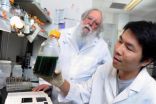(Press-News.org) A University of Toronto study shows that when formerly depressed people experience mild states of sadness, their brain's response can predict if they will become depressed again.
"Part of what makes depression such a devastating disease is the high rate of relapse," says Norman Farb, a PhD psychology student and lead author of the study. "However, the fact that some patients are able to fully maintain their recovery suggests the possibility that different responses to the type of emotional challenges encountered in everyday life could reduce the chance of relapse."
Farb and his team showed 16 formerly depressed patients sad movie clips and tracked their brain activity using functional magnetic resonance imaging (fMRI). Sixteen months later, nine of the 16 patients had relapsed into depression. The researchers compared the brain activity of relapsing patients against those who remained healthy and against another group of people who had never been depressed.
Faced with sadness, the relapsing patients showed more activity in a frontal region of the brain, known as the medial prefrontal gyrus. These responses were also linked to higher rumination: the tendency to think obsessively about negative events and occurrences. The patients who did not relapse showed more activity in the rear part of the brain, which is responsible for processing visual information and is linked to greater feelings of acceptance and non-judgement of experience.
"Despite achieving an apparent recovery from the symptoms of depression, this study suggests that there are important differences in how formerly depressed people respond to emotional challenges that predict future well-being," says Farb. "For a person with a history of depression, using the frontal brain's ability to analyze and interpret sadness may actually be an unhealthy reaction that can perpetuate the chronic cycle of depression. These at-risk individuals might be better served by trying to accept and notice their feelings rather than explain and analyze them."
The research was published in Biological Psychiatry. Farb was under the supervision of professor Adam Anderson in the Department of Psychology.
###
More information, read the article: Mood-Linked Responses in Medial Prefrontal Cortex Predict Relapse in Patients with Recurrent Unipolar Depression.
Media Contacts:
Norman Farb, PhD
Postdoctoral Fellow
Rotman Research Institute
647-235-6281
nfarb@rotman-baycrest.on.ca
Jessica Lewis
Communications
Faculty of Arts & Science
University of Toronto
416-978-8887
jessica.lewis@utoronto.ca
Study shows brain's response to sadness can predict relapses into depression
2011-05-27
ELSE PRESS RELEASES FROM THIS DATE:
Get Your Solar Inverter 'Fix' from Fronius Australia with Business Review Australia
2011-05-27
Business Review Australia takes a look at Fronius Australia. Austrian-based Fronius International has been developing and manufacturing welding equipment and battery technology for over half a century. Since 1995, Fronius expanded its operations to include solar power electronics. With operations spanning the globe, Fronius inverters have been available to the Australian market since 1992. Fronius International realized the growing potential of the Australian solar power market and opened a solar electronics division in Melbourne in October 2010.
Fronius Australia now ...
Aging, obsolete cells prime the lungs for pneumonia
2011-05-27
SAN ANTONIO (May 26, 2011) — Community-acquired pneumonia is the leading cause of infectious death among the elderly. Newly published research from The University of Texas Health Science Center San Antonio suggests why older people are vulnerable and offers a possible defense.
The researchers found that when it comes to aging and pneumonia, one bad apple can ruin the barrel. Lung cells that were supposed to die due to DNA damage — but didn't — were 5 to 15 times more susceptible to invasion by pneumonia-causing bacteria. These bad apples also increased the susceptibility ...
TGen study identifies compounds that could slow down Alzheimer's disease
2011-05-27
PHOENIX, Ariz. — May 26, 2011 — A family of naturally occurring plant compounds could help prevent or delay memory loss associated with Alzheimer's disease, according to a new study by the Translational Genomics Research Institute (TGen).
Beta-carboline alkaloids could potentially be used in therapeutic drugs to stop, or at least slow down, the progressively debilitating effects of Alzheimer's, according to the study published recently in the scientific journal Public Library of Science (PLoS) One.
One of these alkaloids, called harmine, inhibits a protein known as ...
Common transplant drug inhibits breast cancer growth, UNC laboratory study shows
2011-05-27
Tacrolimus, a drug that is commonly used to prevent organ transplantation rejection, inhibits breast cancer growth in pre-clinical studies. The finding from UNC scientists was reported in the May 26th PLoS ONE.
Nancy Klauber-DeMore, MD, associate professor of surgery, said, " We now have a rationale for performing human clinical trials to determine if Tacrolimus reduces breast cancer growth in humans. Since Tacrolimus is already an FDA-approved drug, the safety and toxicity profile is known, which means that Tacrolimus could potentially go directly into a later stage ...
Bruce Marks to Speak at US-Russia Business Council Forum in London
2011-05-27
Leading law firm, Marks & Sokolov, is pleased to announce Managing Director, Bruce S. Marks, will moderate a prestigious panel at the 3rd US Russia Business Council Legal Forum. A world leader in US, Russian and Ukrainian law and litigation, Bruce S. Marks brings a unique and important perspective to the forum.
Taking place in London on June 9th, 2011, the forum will gather the world's leading practitioners in US Russian commercial legal matters. Bruce S. Marks will moderate a panel entitled 'Legal Reform and the Courts in Russia'.
It's more than two years since ...
Current test-based incentive programs have not consistently raised
2011-05-27
WASHINGTON — Despite being used for several decades, test-based incentives have not consistently generated positive effects on student achievement, says a new report from the National Research Council. The report examines evidence on incentive programs, which impose sanctions or offer rewards for students, teachers, or schools on the basis of students' test performance. Federal and state governments have increasingly relied on incentives in recent decades as a way to raise accountability in public education and in the hope of driving improvements in achievement.
School-level ...
People with body-image disorders process 'big picture' visual information abnormally
2011-05-27
People suffering from body dysmorphic disorder, or BDD — a severe mental illness characterized by debilitating misperceptions that one appears disfigured and ugly — process visual information abnormally, even when looking at inanimate objects, according to a new UCLA study.
First author Dr. Jamie Feusner, a UCLA assistant professor of psychiatry, and colleagues found that patients with the disorder have less brain activity when processing holistic visual elements that provide the "big picture," regardless of whether that picture is a face or an object.
The research ...
5 new hot spots where medicine and technology will converge
2011-05-27
Medicine and technology are converging in patient care at a faster pace than most people realize. Space age advancements from point-of-care health technologies like telemedicine to medical robots performing surgery are fast becoming commonplace in many hospitals. What's next?
Ask NJIT Distinguished Professor Atam Dhawan, an electrical engineer and associate dean of the NJIT Albert Dorman Honors College, chair of the the IEEE emerging technology committee, and workshop chair for the upcoming 33rd IEEE Engineering in Medicine and Biology Society (EMBS) Annual International ...
Pan American Metals Pleased to Announce Gold and Silver Once Again the 'Safe Haven' Choice
2011-05-27
Market reports May 24 showed that gold and silver had regained their standing as 'safe haven' investments, with gold remaining comfortably above the $1500 an ounce benchmark, closing the day at $1523, the highest price for three weeks. Silver has also bounced back to close, May 24, at $36.12. Mounting concerns over European debt following rumors of a Greek default helped drive investors back toward the 'safety net' of precious metals. The UK, Italy, Spain and Portugal were causing concern as they faced reduced credit ratings and, in the case of Spain, a change of government. ...
Green and lean: Secreting bacteria eliminate cost barriers for renewable biofuel production
2011-05-27
TEMPE, Ariz.- A Biodesign Institute at Arizona State University research team has developed a process that removes a key obstacle to producing low-cost, renewable biofuels from bacteria. The team has reprogrammed photosynthetic microbes to secrete high-energy fats, making byproduct recovery and conversion to biofuels easier and potentially more commercially viable.
"The real costs involved in any biofuel production are harvesting the goodies and turning them into fuel," said Roy Curtiss, of the Institute's Center for Infectious Diseases and Vaccinology and professor ...




